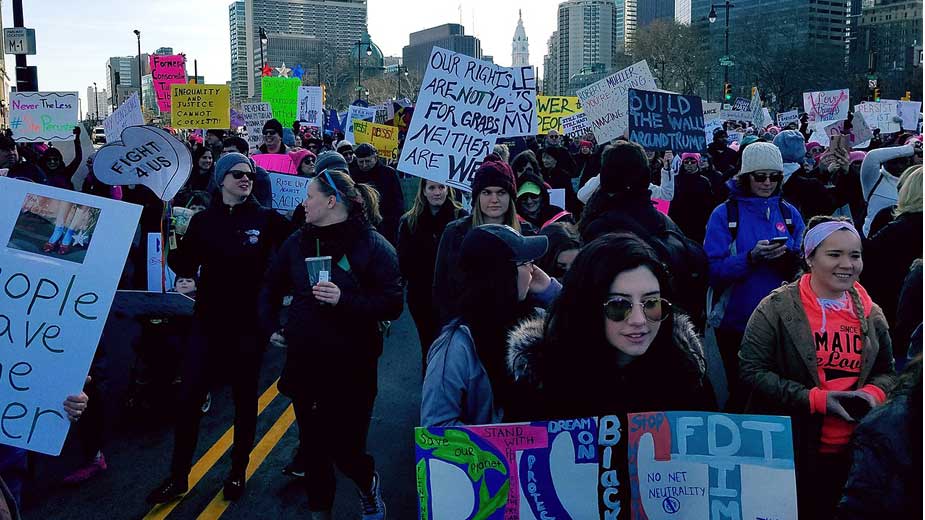#MeToo Drives Coverage for Employment Practices
YOUNGSTOWN, Ohio — Employment-practices insurance policies, which provide coverage for companies that face claims from current or past employees who assert they are victims of some kind of discrimination, are among the top plans local employers are inquiring about, insurance carriers report.
Such policies cover companies “in case somebody sues you for unfair hiring practices, unfair firing practices, discrimination and things like that,” says Trent Cailor, president of Cailor Fleming Insurance, Boardman.
Much of the discussion about employment-practices coverage is driven by the #MeToo movement. “That is coming from the news cycle and everything going on in our world today. It’s at the forefront of everybody’s mind,” says Merry Wagner, owner of Macchione, Richardson & Wagner Insurance Agency in Girard.
On average, the amount of coverage is around $100,000, she reports.
It “gets discussed quite often,” even if clients don’t purchase the policies because of the price, Wagner says. Sometimes they choose to self-insure against that risk.
“Interestingly enough, we have a lot of smaller companies take a great interest in it,” Wagner says. “If you don’t have the ability to self-insure that risk, it has some appeal.”
Still, customers don’t often buy the policy, Cailor allows.
“People feel it’s expensive for the coverage, and there’s a deductible,” he says.
Low turnover in employment locally is one factor that drives down risk, Cailor continues. “Because of the slightly down economic times, you’re not hiring a whole lot of new people. People look at that and say, ‘What are the odds I’ll have a loss?’ ”
The kinds of discrimination claims for which employers seek protection takes many forms, says Dave Thompson, president and owner of the Gibson Agency in Girard. One that has become more prominent over the past decade is age discrimination.
“Probably within the last 10 years, there’s been more and more suits on it,” Thompson says. An older employee who is fired might get an attorney to pursue a claim that the employer dismissed the individual and hired a younger employee because of things like higher cost of benefits.
“We’ve sold quite a bit of it lately,” confirms Stan McCamon, president of McCamon-Hunt Insurance Agency, Boardman.
A typical company can pick it up for an annual premium of $3,500, but a larger entity might pay tens of thousands of dollars. Beyond the size of the policy itself, McCamon recommends including coverage to pay for covering attorneys’ costs in defending against such suits.
Interest is being driven by many things, McCamon says. “You’re seeing more suits from more disgruntled employees and from more people being let go. Whether it’s age, sex, any kind of discrimination, you’re seeing activity in these kind of suits,” he says.
Ellie Platt, president and principal agent of Platt Insurance & Financial, agrees that interest has grown in employment-practices policies in the last two years with the rise of #MeToo and increased awareness of sexual harassment. “A lot of businesses are more aware of not just coverage they need, but practices, policies and procedures they must have to reduce and prevent that from happening,” she says.
The size of the policy typically is $1 million per incident or $2 million aggregate, although some go even higher, Platt says. “We’ve gone up as high as $6 million,” she says.
A dismissed employee doesn’t have to be the cause of legal action in a sexual harassment case, Thompson says. A worker might claim he is subjected to sexual harassment or, as an example of a third-party claim, a delivery person might assert harassment by a secretary or other company employee.
One coverage that commercial clients are inquiring about is property, Wagner says. “Everyone is looking for the best property rates they can get,” she says. Clients also are looking for general liability and errors and admissions coverage “for any mistakes that you would make in the line of work that you’re engaged in,”
Other policies companies might seek include professional liability coverage, including firms that deal with the medical fields or consultants that deal with clients that range from churches to rehabilitation companies, Thompson says.
Auto coverage, and its cost, represents another area of concern for clients, Cailor says. Losses have been “pretty bad” in the commercial auto insurance market, driving prices up “so companies with large vehicles or fleets are seeing increases,” he says.
Platt Insurance also deals with new entrepreneurs, many of whom worked at General Motors Lordstown or companies affected by the closing of the plant. General-liability coverage is “really where we get started,” Platt says.
Much time is spent helping new business people navigate the gray areas between personal and business insurance, she reports.
Entrepreneurs who are operating home-based businesses may find they have limited coverage under their homeowner policies.
If an owner uses a personal vehicle for his business, he will find that he is not covered by his personal auto policy should an accident occur.
Pictured: Women’s march in Philadelphia, Pa. in 2018. (Image: Rob Kall from Bucks County, PA, USA [CC BY 2.0])
Copyright 2024 The Business Journal, Youngstown, Ohio.



